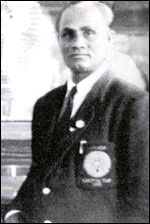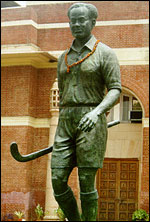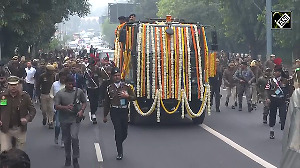While Indian hockey desperately tries to shed its underdog image, one man remains the guru of the game in the subcontinent. He is the mercurial Dhyan Chand.
The hockey wizard not only mesmerised millions within pre-Partition India but became a household name in all hockey-playing nations. His deft stick-work and amazing ball control left fellow players and spectators awestruck.
For two decades, until he bid goodbye to international hockey in 1948, Dhyan Chand was virtually synonymous with hockey, playing numerous matches and scoring hundreds of goals.
 He was admired and feared by his opponents, who felt that the ball got stuck to his stick when he played. But his fame notwithstanding, Dhyan Chand, a centre-forward, was an innately selfless person. If he felt either of the two flanks was in a better position to score, he would flick the ball to the well-placed player instantly.
He was admired and feared by his opponents, who felt that the ball got stuck to his stick when he played. But his fame notwithstanding, Dhyan Chand, a centre-forward, was an innately selfless person. If he felt either of the two flanks was in a better position to score, he would flick the ball to the well-placed player instantly.
Legend has it that after seeing him play at the 1936 Berlin Olympics, Adolf Hitler offered Dhyan Chand, a major in the British Indian army, German citizenship and a higher army post. The prolific striker politely turned it down.
Dhyan Chand was part of three gold medal-winning Indian teams at the Olympics -- in Amsterdam (1928), Los Angeles (1932) and Berlin, where he was captain.
Born in Allahabad, Uttar Pradesh, on August 29, 1905, he was named Dhyan Singh. One of his two brothers was Roop Singh, who too went on to become a prolific hockey forward.
As Dhyan Chand displayed his abundant hockey skills, Pankaj Gupta, his first coach, predicted he would one day shine like a 'chand' [moon].
"That is how father got his surname 'Chand'," said son Ashok Kumar, himself an Olympian who starred in India's 1975 World Cup triumph.
Dhyan Chand took to hockey in his teens and quickly came to acquire excellent dribbling skills and an uncanny knack for scoring goals.
During a 1935 tour of New Zealand and Australia, his second trip Down Under, he scored 201 goals out of the team's 584 in 43 matches.
Before the 1928 Olympics, he exhibited his skills in England, netting 36 of India's 72 goals in 10 matches at the London Folkstone Festival. Then, at the Amsterdam Olympics, he netted twice in India's 3-0 win over The Netherlands in the final.
In the 1932 Olympics, when India famously drubbed the United States 24-1 -- still a world record for the biggest margin of victory -- Dhyan Chand's contribution was eight goals. The same year, he netted a whopping 133 goals out of India's 338.
His hunger for goals was seemingly unending, and in 1936 he continued his prolific form. On the Indian team's world tour, he pumped in 59 goals out of the team's tally of 175.
But Dhyan Chand was probably at his zenith during the Berlin Olympics. The Germans were so scared of him that they resorted to rough play in the final, leading to Dhyan Chand losing a tooth. But the valiant Rajput returned to the field after first aid. When the match ended, his contribution in India's 8-1 win was six goals.
 Even after he turned 42, Dhyan Chand continued to score virtually at will, as he banged in 61 goals to help India win all its 22 matches in East Africa in 1947-48. It was then that he stopped playing international hockey.
Even after he turned 42, Dhyan Chand continued to score virtually at will, as he banged in 61 goals to help India win all its 22 matches in East Africa in 1947-48. It was then that he stopped playing international hockey.
After his playing days, Dhyan Chand earned a diploma in coaching from the National Institute of Sports, Patiala. But he was not as successful as coach; he found it difficult to explain things that came to him so naturally as a player.
Dhyan Chand won a number of awards and accolades during his illustrious career. One of the most touching gestures came from the residents of Vienna, who built a statue of the Indian with four hands and four sticks, signifying his unparallel control over the ball.
In 1956, the Indian government conferred on him the Padma Bhushan -- he was never presented the Arjuna award though -- and released a postage stamp on December 3, 1980, exactly a year after he died in hospital.
-- This Indo-Asian News Service feature first appeared on rediff on August 28, 2001.







 © 2024 Rediff.com -
© 2024 Rediff.com -